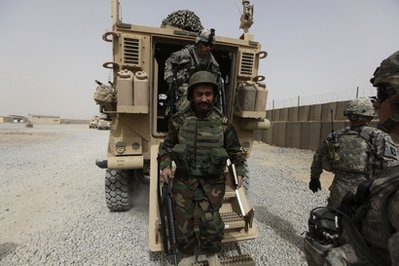-
News >World
Afghanistan security force more than a year away
2010-08-24 06:20
American and Afghan Army soldiers exit an armored vehicle during a mission at Strongpoint Terminator, a jointly-operated US-Afghan base, in Zhari district, Kandahar province, southern Afghanistan, Monday, Aug. 23, 2010. [Agencies]?WASHINGTON – A senior US commander on Monday wouldn't predict when Afghanistan might take control of its own security and warned that NATO needs at least another year to recruit and train enough soldiers and police officers.
The assessment by Lt. Gen. Bill Caldwell, the head of NATO's training mission in Afghanistan, further dims US hopes that the planned US withdrawal next year will be significant in size.
US President Barack Obama has said that troops will begin pulling out in July 2011, the size and pace of withdrawal depending on security conditions. Defense officials, including Defense Secretary Robert Gates, have said they believe next summer's pullout would be modest.In a Pentagon briefing, Caldwell told reporters that Afghan army and police forces won't reach sufficient numbers until Oct. 31, 2011?-- three months after Obama's deadline to start US withdrawals.
NATO has set the goal of creating an Afghan military and police force of 305,600 personnel?-- 171,600 army and 134,000 police.
There are currently 249,500 personnel?-- 134,000 army and 115,500 police.
But Caldwell predicted that desertion and injury rates are so high among Afghan forces that NATO will have to recruit and train 141,000 people to ensure it has the 56,000 additional personnel needed next fall.
Because Afghanistan is still scrambling to recruit and train its security forces, Caldwell said there was no accurate estimate on when Kabul might take control of even the more peaceful parts of the country.
"It doesn't mean in small isolated pockets that they can't have the lead with coalition" support, Caldwell said of Afghan forces. "But to say that they'll be able to do much more before October of next year would be stretching it, only because we haven't finished the development of their force."
Caldwell also said it is likely the US and international community will have to pay for that force for some time, even after NATO troops leave.
"The US has made an enduring commitment to be supportive," he said.
As was the case in Iraq, the training and equipping of Afghan security forces is considered the linchpin in the US exit strategy. However, the effort has been particularly difficult in Afghanistan, where illiteracy rates are high, corruption is rampant and there is little banking infrastructure to ensure troops get paid.
Last June, Gates predicted that Afghan forces could take control of security in some areas by the end of this year. But diplomats in the US and Europe have since said the first hand over may not occur until early next year.
A NATO conference in Lisbon in November would decide which areas would be handed over first.
Caldwell said that notable gains have been made in the past nine months. For example, he said that the size of the Afghan army and police has more than doubled from levels in previous years.
Caldwell said that recruiting and retention has been aided by pay increases, particularly for Afghan police, as well as a "new sense of urgency" by the Afghan government to boost recruitment.
The US also has sent more police and military trainers to Afghanistan, mostly fixing a severe shortfall that dominated NATO meetings last fall, Caldwell said.
Still, challenges remain. Caldwell said that fewer than 18 percent of the Afghan force is literate, preventing most soldiers from recognizing the serial number on their weapons or performing other basic tasks.
Illiteracy also has kept some Afghans from being able to access their wages through an electronic banking system, established by NATO to reduce the risk that corrupt officers would divert some of the money.
Caldwell said that some 27,000 recruits are enrolled in NATO literacy programs?-- a figure he hopes will grow to 100,000 by next summer.
Another major issue is attrition. Caldwell said the attrition rate last month for Afghanistan's civil order police force was 47 percent. The figure is down from 70 percent last year but remains "unacceptable," he said.
